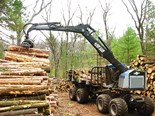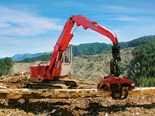Have loggers dropped the ball?
In his latest column, Patrick Cox discusses outsider comments on the logging industry and how the industry must only be policed by those who are involved
A few weeks ago, I happened to watch a group on one of the AM shows on TV discussing the logging industry. It was the first death anniversary of Helen Kelly, and there was a woman on the show, dripping in jewellery and designer clothes, making what I thought was stupid comments.
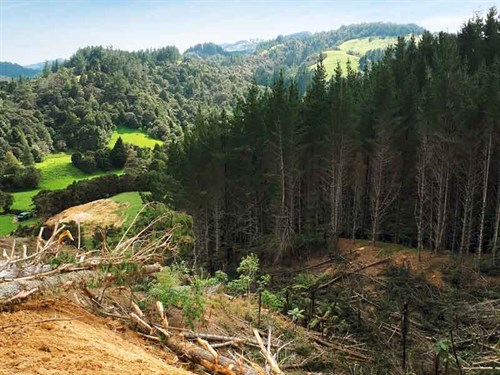
She accredited Helen as the champion of logging industry for helping to bring down the death rate. She went on to say that since Helen’s death, the loggers had dropped the ball and let themselves go because there have been five forestry-related deaths this year.
Let’s put this in perspective. When the health and safety policy was released in 1993, Helen was nowhere to be seen, and it was not until 2007 did Kelly start to fight over the unacceptable level of deaths in the forest industry. Whatever Kelly did for the good of the industry has to be recognised.
Then for someone else to come along and accuse the loggers of bad practice was just in poor taste. Before anyone can make an informed decision on any industry, they have to do their homework. How many logging crews had the woman on the TV show visited and what research had she done to be able to make an informed decision? Everyone has the right to make a statement but it’s best to research about the topic before making a statement on the television.
There is only one way forward for the logging industry—it has to be policed by those who are involved. If an outsider wants to join in, that’s excellent, but don’t just stand on the sideline and yell about it; run on the paddock and get involved. Sometimes, an outsider with a genuine interest might see things from a different perspective.
Health and safety: Have we got it, or do we change it
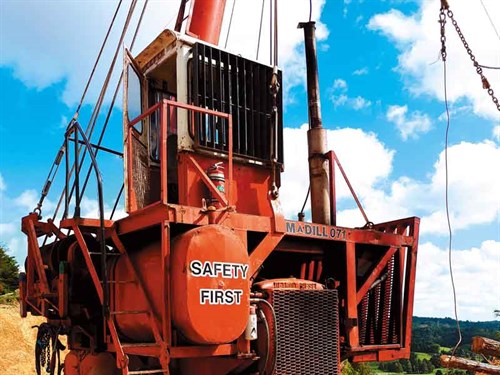
One question to address after more than two decades of health and safety is have we got it right or do we radically change the system?
In the past, policies have been imposed by governments, which haven’t necessarily worked in the favour of the logging industry. Here’s an example: at the beginning of what we have in place today, decisions were made by forest owners without consulting loggers. Chainsaws were renowned for ‘kickback’ with many loggers getting cut arms, hands, and a few being hit in the face.
So it was decided to put a mitt on the handlebar to try and get loggers to hold onto the saw properly. They were badly designed and operators would still stick their thumb on top of the handlebar.
To solve the problem, chainsaw manufacturers developed a chain or inertia brake, so when ‘kickback’ occurred, the hand flew into the brake and stopped the chain spinning. But this is like putting a band aid on a wound—Kiwis are good at putting a band aid on a problem rather than fixing it.
So, the forest owners insisted all chainsaw operators would have to have a mitt as well as a chain brake, but how could you activate a chain brake if your hand was stuck in a mitt? I disputed this with a forestry supervisor on one occasion, and he was adamant that this was a company policy and we would all adhere to it.
All of the above about mitts and brakes could have been eliminated if from day one, the new logger on the job was taught to hold a chainsaw properly. The top hand on the handle bar, the thumb should be under the bar and not balanced on the top, and the same goes for the backhand.
All you need is a good grip and good training. You never see a rally car driver with his hands resting on top of the steering wheel. He always has a good grip on it. After a few years, someone decided we needed ballistic nylon logging chaps.
Only one size was available on the market and the taller guys had half their lower leg exposed, so you can see where this is going. It has taken many years to perfect good logging protection equipment, and it will never stop. There will always be a better product.
Machines are constantly being upgraded and loggers take what comes out of the factory and tweak the design to suit their own operation. In the early years, we had machines designed for Northern Hemisphere logging that was not suitable for our conditions. It has only been since the ’90s that we have started to produce purpose-built logging machines rather than modify earthmoving construction equipment to fill the gap.
How can someone sitting on the AM show make an informed comment on what’s best for loggers? The comments made by such people have a huge impact on the industry
by bringing it into a bad light.
Opportunities in the forestry industry
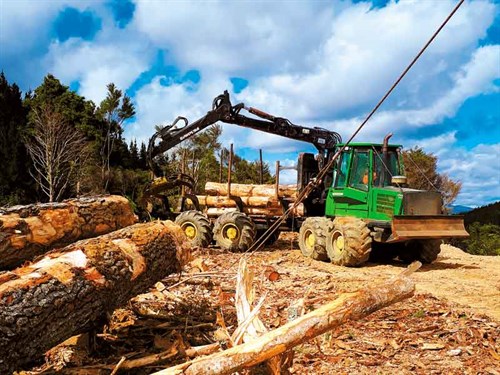
On another note, I was talking to Luke Cox the other day from Cox Forestry Services and he said they are constantly on the lookout for good operators to join their organisation.
There are excellent remuneration packages available in the logging industry and working conditions have improved tenfold with more and more positions for machine operators as the industry becomes more mechanised.
There are great opportunities for school leavers to join the logging industry. Don’t be frightened by the publicity around the logging industry. Right now, I would feel safer working in the bush than driving on the roads to and from work.
The learning curve is imploding. Employers are taking people on without tertiary education. Are our young people getting over educated and then finding it difficult to get a job? Good basic reading, writing, and maths is a good place to start and with basics in place, you can get into the workforce to develop good work ethics and common sense. You can continue learning while working and contribute to the society.
This must be far more rewarding than spending years getting a tertiary qualification and a mountain of debt and then finding out it is all useless.
Keep up to date in the industry by signing up to Deals on Wheels' free newsletter or liking us on Facebook.











